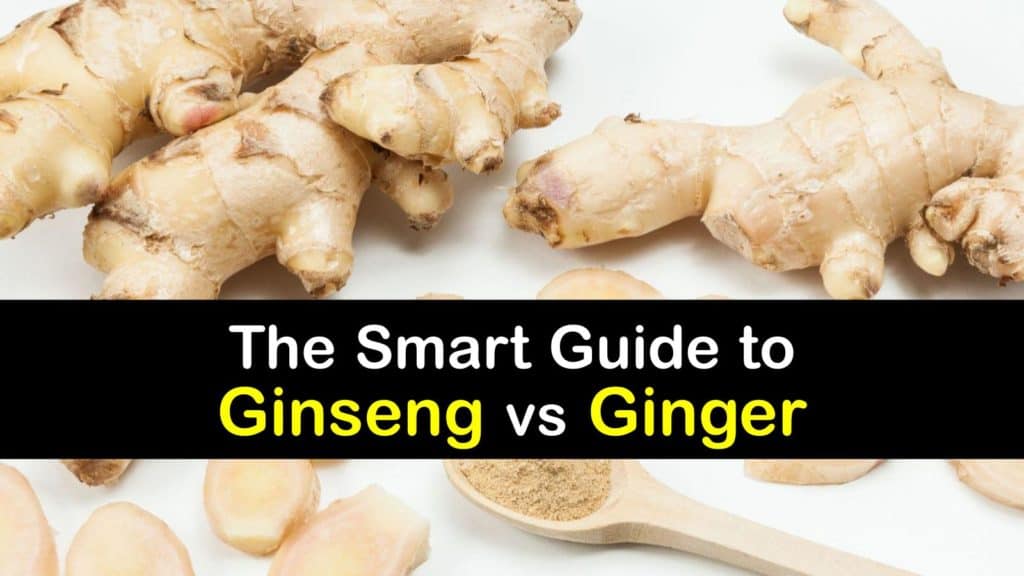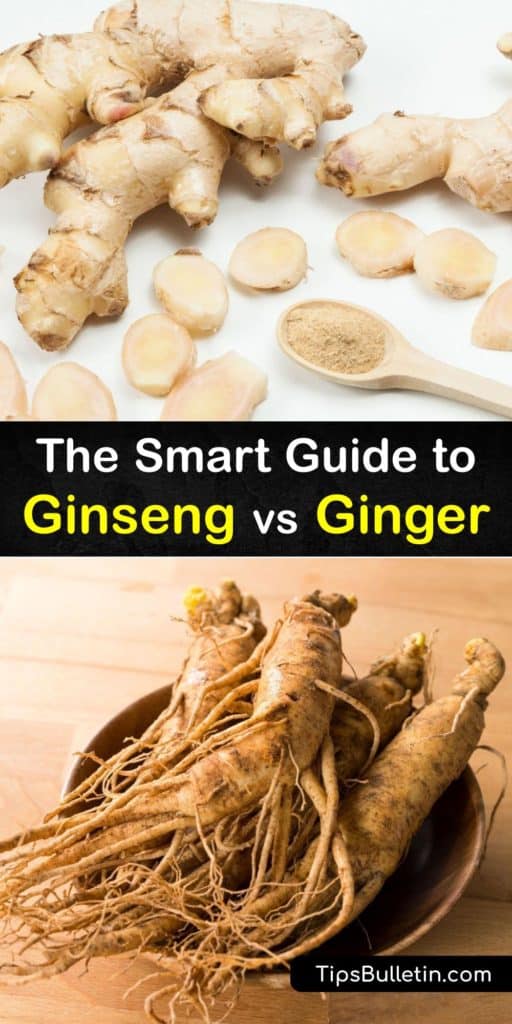If you look up ginger root and ginseng root images, they do resemble each other in some ways, but are they similar? We all know that ginger is a common spice for baked goods, but ginseng is a different plant altogether. Learn the differences between ginseng vs ginger and the health and wellness benefits of each root.
Both ginger and ginseng have edible leaves and roots and are useful for medicinal purposes. However, they are completely different plants. While they are common in traditional Chinese medicine, these plants have grown in popularity in the west and are easy to find in supplement form in many health stores.
There are a variety of uses for ginger and ginseng, but the benefits vary between the two. Not only that, but there are different types of ginseng and ginger, which makes it even more confusing. How do they benefit you, and which one is better for your health?

The Differences and Beneficial Uses of Ginseng and Ginger
Did you know that planting ginger indoors is as easy as growing ginseng? If you choose not to grow these special roots, you can always buy them.
Browsing through herbal supplements at your local nutrition shop is often confusing since there are many to choose from. Is ginseng the same as ginger, and which ones are good for brain function?
While these roots have the same general appearance, they come from different plants and have varying uses as medicinal herbs. It is crucial to seek medical advice from your healthcare provider when considering incorporating herbal medicine into your life.
Some herbs have side effects, especially for those currently taking medication, such as calcium channel blockers. We explain the difference between ginseng and ginger and the benefits they provide to your health and well-being.

Is Ginseng the Same as Ginger?
If we were to place a ginger root and ginseng root on the table in front of you, you’d probably have difficulty determining which one is which. These roots come from entirely unrelated plants, but when to plant ginseng is the same as when to plant ginger. What is the difference between ginger and ginseng?
Ginger is a flowering plant and one of the most well-known spices in the world. It originated in Southeast Asia and is closely related to cardamom and turmeric.
All parts of the ginger plant are edible, but the rhizome, or root, is popular for making everything from soup and marinade to tea and soda. Stores sell ginger in root, powder, and paste forms. If you don’t have ginger on hand, you can use a substitute for ginger with almost the same taste.
Ginseng is a green, leafy plant with orb-like flowers. It is a native medicinal herb that grows in the wild and is also farmed. The root is used primarily in Chinese medicine, and ginseng is now a popular additive in energy drinks.
Difference Between Ginseng and Ginger Types
Not only are ginger and ginseng a completely different plant, but they each also have many types with varying uses. We explain the difference between ginseng and ginger varieties and how their benefits differ.
While there are many types of ginger, we’ll focus on some of the most popular. Common ginger is the easiest to find at the grocery store. This variety tastes delicious in curries and stews, but it is also good for indigestion. Storing fresh ginger in the fridge or freezer is easy.
White ginger is an ornamental plant that many consider an aphrodisiac, while peacock ginger grows purple flowers and has various cosmetic uses.
There are two types of ginseng, Korean or Asian ginseng and American ginseng, and there are 13 species classified under Panax ginseng.
Clinical trials prove that the different ginseng varieties provide various benefits and effects. For example, Asian types are more of a stimulant than American ginseng.
There is also red and white ginseng. While they are the same, they are processed differently to prevent decay, which causes the color and price difference.
Korean red ginseng is the whole root and skin that goes through steaming and drying, while white ginseng is peeled and dried. These processes alter the ginsenosides in both types, giving them varying benefits.
Health Benefits of Ginseng vs Ginger
Is ginseng the same as ginger? No, they are entirely different, and it’s vital to understand each plant to know how to use it in your daily life. Learn the many health benefits of ginger and ginseng types.
Ginger is available in many forms, including root, spice, extract, capsule, and oil, and it has many antioxidant effects. Store ginger root properly according to its form for the most benefit. Digestion is one of the more traditional uses of ginger root, and it is helpful for nausea and diarrhea.
It is good for alleviating anti-inflammatory issues, arthritis, and lowering blood sugar. It is also a possible treatment for chronic indigestion. Clinical studies reveal that people who are given a ginger capsule versus a placebo experienced symptom relief sooner.
There are many benefits to ginseng, and it all depends on the type. Some studies link the actions of ginseng to enhanced nitric oxide and scavenging activity of free radicals. They are available as a ginseng extract, capsule, powder, or fresh root.
Asian ginseng may help the body deal with stress, but there is no evidence of adaptogens. Ginseng use is traditional for longevity and fatigue and has been studied for its effects on the immune system, erectile dysfunction, and cardiovascular health.
Ginseng from Korea contains a ginsenoside which acts as an antioxidant in the body, potentially preventing age-related diseases.
Native Americans used American ginseng (Panax quinquefolius) for treating fevers and headaches, as well as a stimulant. However, recent research is ongoing to study the impact on type two diabetes, colds, and flu.
Siberian ginseng is believed to be an adaptogen and is different from Asian and American types. Traditionally used for colds, flu, and energy, it is thought to stimulate the immune system and improve quality of life.
Before using ginger or ginseng, it’s important to know when ginger is bad, as well as ginseng, so you don’t consume a spoiled root.
We are all about healthy living these days, and building up a strong immune system is essential, but trying to find the right food or supplement to incorporate into our diet can be overwhelming.
Fortunately, researchers regularly perform clinical studies to discover ginger and ginseng’s benefits and help us make the right choice.

There are many differences between ginseng vs ginger, but they both have something to offer your health, so why not share our guide to ginger and ginseng with your family and friends on Pinterest and Facebook?